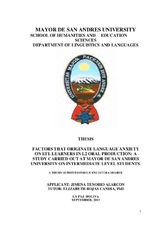Mostrar el registro sencillo del ítem
Factors that originate language anxiety on EFL learners in L2 oral production: a study carried outat Mayor de San Andres university on intermediate level students
| dc.contributor.author | Tenorio Alarcón, Jimena | |
| dc.contributor.author | Rojas Candia, Elizabeth (Tutor) | |
| dc.date.accessioned | 2018-07-12T02:25:31Z | |
| dc.date.available | 2018-07-12T02:25:31Z | |
| dc.date.issued | 2013 | |
| dc.identifier.citation | Lenguas Extranjeras | es_ES |
| dc.identifier.uri | http://repositorio.umsa.bo/xmlui/handle/123456789/16915 | |
| dc.description.abstract | How do you feel when you are asked to speak in your English class? Most of the students would say that they feel nervous, because talking to the teacher or to their classmates makes them feel anxious. Learning a foreign language is different from learning other subjects, since learners must develop receptive skills (listening and reading) and productive skills (speaking and writing). Therefore, learning a foreign language is not an easy task because there are many factors that are involved in developing skills. Certainly, both skills are important; however, this research focuses on one of the productive skills, which is oral production. One factor that influences on oral production is the feeling of apprehension or nervousness, known as foreign language anxiety. When learners are unable to convey adequately their messages in oral production activities in the classroom, they may feel uncomfortable when speaking in English language. Consequently, they might develop foreign language anxiety. The present research investigated the factors that originate language anxiety in English oral production; how this language anxiety is expressed and its effects on students’ oral production. In addition, the study was carried out at the department of linguistics and languages at Mayor de San Andrés University, and the participants were intermediate English students, whose first language is Spanish. In order to fulfill the objectives of this study, the used instruments were: Classroom Observation and a Questionnaire. The findings indicated the factors that originate language anxiety were: linguistic (lack of vocabulary, grammar, pronunciation, etc), psychological (lack of self-confidence), and pedagogical (some classroom practices: oral activities, fear of negative evaluation).These factors impeded students to convey their messages and participate in oral production activities. Besides that, language anxiety was manifested throughout some psychological reactions: physical reactions verbal reactions, and emotional reactions. Therefore, this research is organized into five chapters. Chapter one presents the background, the statement of the problem, the general and the specific objectives, justification, the conceptual definitions of terms and the limitations of the study. Chapter two focuses on the theoretical foundations that support the study. Chapter three describes the methodological design which deals with type and characteristics of the study, universe, sample selection, data gathering instruments and data analysis which is framed into descriptive and qualitative research. Chapter four is related to the interpretation of the results. Finally, chapter five is devoted to the conclusions and recommendations. | es_ES |
| dc.language.iso | en | es_ES |
| dc.publisher | Universidad Mayor de San Andrés. Facultad de Humanidades y Ciencias de la Educación. Carrera de Lingüística e Idiomas. | es_ES |
| dc.subject | INGLES-APRENDIZAJE | es_ES |
| dc.subject | PSICOLOGIA DEL APRENDIZAJE | es_ES |
| dc.subject | ANSIEDAD | es_ES |
| dc.title | Factors that originate language anxiety on EFL learners in L2 oral production: a study carried outat Mayor de San Andres university on intermediate level students | es_ES |
| dc.type | Thesis | es_ES |

